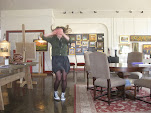I gained some revealing insight into how people perceive my silly art in my printmaking class final crit.
My classmates told me my work is understated, approachable, always contains unexpected details.
I'm not really the sort of person to want the limelight, I like being invisible, a background character. My favorite place to be is behind the scenes. I ask myself all the time why I chose to study art. My work isn't flashy, and sometimes contains a dry sense of humor. I'm terrified of becoming self-obsessed and absorbed. This, I feel is a deep problem in the upper-levels of the art world, and to some small extent, in the college art world. I imagine this translates to my work being understated, humble (maybe, although even writing that world makes me feel self-obsessed), honest and sincere.
One of my classmates said my art equally reaches children and adults, without talking down to one or patronizing the other. My work for that particular class focused on the problem of plastic grocery bags, but everyone felt that I was being informative and encouraged without guilt tripping.
In one of my designs, I included a little plastic bag hooked onto a edge, as if it had blown by and gotten caught like you will occasionally see in trees. Many of my classmates didn't notice this detail until our final critique. In my perspective, this also translates to the dumb little mistakes I always make in my work and which I've become resigned to. Missing a couple pieces in a background pattern here, forgetting to color that little bit there. It's infuriating and I know for a fact that I have missed on opportunities because of this personal defect, but I try to compare it to the tradition of making intentional mistakes in weaving.
This critique was one of the most insightful I've had in a very long time, and I felt bad I didn't participate more when we were talking about all of my classmates work. It was definitely nice to know my artwork seems to represent what I want it to.
My classmates told me my work is understated, approachable, always contains unexpected details.
I'm not really the sort of person to want the limelight, I like being invisible, a background character. My favorite place to be is behind the scenes. I ask myself all the time why I chose to study art. My work isn't flashy, and sometimes contains a dry sense of humor. I'm terrified of becoming self-obsessed and absorbed. This, I feel is a deep problem in the upper-levels of the art world, and to some small extent, in the college art world. I imagine this translates to my work being understated, humble (maybe, although even writing that world makes me feel self-obsessed), honest and sincere.
One of my classmates said my art equally reaches children and adults, without talking down to one or patronizing the other. My work for that particular class focused on the problem of plastic grocery bags, but everyone felt that I was being informative and encouraged without guilt tripping.
In one of my designs, I included a little plastic bag hooked onto a edge, as if it had blown by and gotten caught like you will occasionally see in trees. Many of my classmates didn't notice this detail until our final critique. In my perspective, this also translates to the dumb little mistakes I always make in my work and which I've become resigned to. Missing a couple pieces in a background pattern here, forgetting to color that little bit there. It's infuriating and I know for a fact that I have missed on opportunities because of this personal defect, but I try to compare it to the tradition of making intentional mistakes in weaving.
This critique was one of the most insightful I've had in a very long time, and I felt bad I didn't participate more when we were talking about all of my classmates work. It was definitely nice to know my artwork seems to represent what I want it to.

